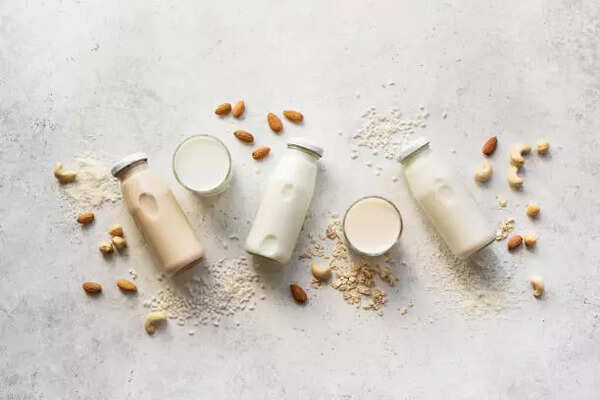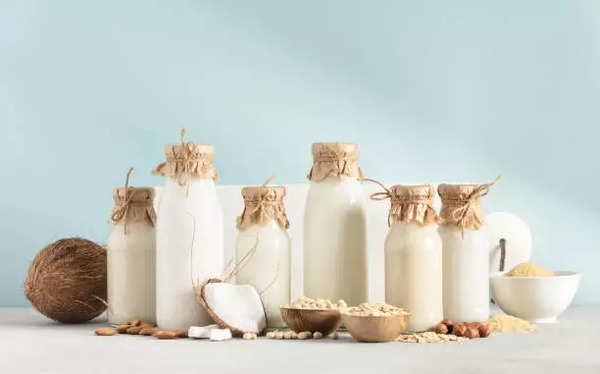When it comes to promoting healthy hair growth, diet plays a crucial role in providing the essential nutrients that nourish hair follicles and encourage strong, shiny hair. Among the various food options, both milk and nut milk have gained popularity as excellent sources of nutrients. However, the choice between traditional cow’s milk and plant-based nut milks (like almond, oat, or cashew milk) can be somewhat confusing, especially when it comes to their impact on hair growth. Let’s find out the nutritional benefits of both types of milk and how they contribute to healthier hair.
Milk and hair growth
Traditional cow’s milk is a rich source of several vital nutrients that directly contribute to hair health, including:
Protein: Milk is packed with high-quality proteins, including casein and whey. These proteins are essential for hair growth, as hair itself is primarily made up of keratin, a type of protein. Adequate protein intake is vital for hair strength and texture, and it also helps prevent hair breakage and thinning.

Vitamins and minerals: Milk contains a wide variety of vitamins and minerals, such as Vitamin A, Vitamin D, Vitamin B12, calcium, and potassium, all of which promote healthy hair growth. For example:
Vitamin A supports the production of sebum, a natural scalp oil that helps keep hair hydrated.
Vitamin D plays a crucial role in stimulating hair follicles and promoting new hair growth.
Vitamin B12 helps in the production of red blood cells, which deliver oxygen to hair follicles, boosting growth.
Calcium strengthens hair, preventing breakage and supporting healthy growth.
Fats: The fats found in whole milk (like saturated fats) can help nourish the scalp and support the production of essential oils, keeping hair hydrated and glossy.
However, there are some downsides to cow’s milk. For individuals who are lactose intolerant or have a dairy allergy, consuming milk can cause digestive discomfort, bloating, or even exacerbate skin conditions like acne, which may indirectly affect hair growth.
Nut Milk and hair growth
Nut milks, such as almond milk, oat milk, and cashew milk, are plant-based alternatives that offer a different nutritional profile. They are often chosen for their lactose-free nature and lower calorie content. Here’s how some popular nut milks contribute to hair growth:
Almond milk
Rich in Vitamin E: Almond milk is a powerhouse when it comes to Vitamin E, an antioxidant that helps protect the scalp and hair from oxidative stress caused by free radicals. Vitamin E also improves blood circulation to the scalp, encouraging healthier hair follicles and growth.
Magnesium: Almond milk is a good source of magnesium, which helps reduce hair thinning by promoting a healthy scalp and preventing hair loss.
Oat milk
Silica: Oat milk is known for containing silica, a mineral that strengthens hair and improves its elasticity, making it less prone to breakage. Silica also encourages healthier, thicker hair by supporting the structural integrity of hair strands.
B vitamins: Like cow’s milk, oat milk contains B vitamins, particularly B1 and B7 (biotin), which are essential for healthy hair growth. Biotin, in particular, is known for its ability to prevent hair loss and promote hair regeneration.

Cashew milk
Iron and zinc: Cashew milk provides a decent amount of iron and zinc, both of which are important for hair growth. Iron helps carry oxygen to hair follicles, while zinc supports the healthy function of the scalp’s oil glands, preventing hair thinning and breakage.
Healthy fats: Cashew milk contains healthy fats that nourish the hair and promote a smooth, shiny appearance.
Which is better for hair growth?
While both cow’s milk and nut milk have their advantages for hair growth, the best option depends on your individual needs and dietary preferences. Here are some considerations:
If you are looking for a protein boost: Cow’s milk contains a higher amount of protein compared to most nut milks. If your goal is to provide your hair with the building blocks for keratin (the protein that makes up hair), cow’s milk may be a better option, particularly if you’re not lactose intolerant.
If you are lactose-intolerant or vegan: Nut milks are an excellent alternative. Almond, oat, and cashew milks are naturally lactose-free and provide a good variety of vitamins and minerals that promote healthy hair. They are particularly beneficial for those looking to avoid dairy while still getting nutrients like Vitamin E, magnesium, and silica.
For scalp and hair nourishment: Almond milk, due to its high Vitamin E content, and oat milk, with its silica, stand out as top choices for nourishing the scalp and preventing hair damage. Both milks provide antioxidants that protect the hair from environmental stressors and oxidative damage.
If you want lower calories: Nut milks generally contain fewer calories than whole cow’s milk, making them a suitable choice for those looking to reduce calorie intake while still reaping the benefits for their hair. For individuals monitoring their weight, nut milks provide a lighter option without compromising on nutrients.
Both milk and nut milk offer unique benefits for hair growth, and the right choice depends on your dietary needs and preferences. Cow’s milk is a great source of protein, calcium, and Vitamin D, all of which play an essential role in promoting healthy hair. On the other hand, nut milks are a fantastic lactose-free, lower-calorie alternative that provide essential nutrients like Vitamin E, silica, and magnesium, which are excellent for scalp health and nourishing the hair.















































